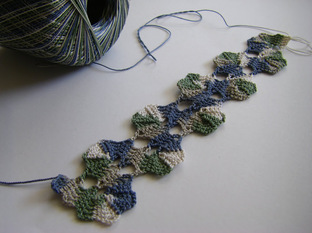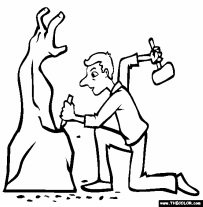|
progress - advancement toward a goal; growth and development; onward movement
In a sentence: "The day progressed from sunrise to sunset without incident." In a sentence: "His rehabilitative progress was self-evident. --- Writing is like life in that you should expect forward momentum to be marked with starts and stops. You should expect periods during which words flow through you, and periods during which they trickle or cease. This is because all writing - business, biography, fiction, fantasy, journaling and journalism - happens as life happens. Life flows, starts, stops, trickles and ceases. There are periods of constant activity and periods of rest. And so the concept of progress may be applied to writing as it can be to life. Writing progresses from sentence to paragraph to page, from chapter to book, beginning to end. And there are periods of inactivity or writer's block. This is normal. A writer's job is not to force life; that is not progress. A writer is a filter for life, taking in the world around and re-imagining it with greater comprehension and emotional impact. The aptitude of your filter is what separates writing from mere transcription. The fineness of your gauge, how quickly you sift, and your examination of the residue of life is what makes great writing. As long as you are drawing in life, filtering it into something finer, and sharing it with the world, you are making progress in your writing and as a writer. - KE • Exercise for writers - "We write to taste life twice." - Anais Nin Do not write today. Go out and live life. Tomorrow, write about your day off.
0 Comments
transformation - change in form, appearance, nature, or character
In a sentence: "When the transformation was complete, he no longer resembled his former self." --- Chapter One is the most important day in the life of your novel's main character. This is the day everything changes. As in Rosencrantz And Guildenstern Are Dead, the characters do have a life before the book begins, but today is different. Today everything known must come undone. That inner doubt the main character has carried throughout life, must be confirmed. Somewhere deep inside, your character knew it all along: Nothing is as it seems. And now he or she must transform in order to adapt. This is the character's arc, and this is why the reader has been invited. Epic journeys of transformation are lonely. The reader offers companionship and support in exchange for being entertained. As in The Neverending Story, sometimes the main character even senses the presence of their companion. The reader must be transformed as well. Swayed by the perseverance of the main character, the reader must be inspired to believe the unbelievable. (After all, it is a work of fiction.) The transformation should be emotional and spiritual. A-ha moments, epiphanies, and revelations. A happy ending is not mandatory, but change is. If no one and nothing is altered by the conflict and resolution in your story, it is not significant enough to tell. - KE • Exercise for writers - We all have our favorite places to write -- a cherished desk, backyard porch, coffee shop nook, in bed. Change places and allow your new location to transform your character's outlook on life. vision - a vivid, imaginative anticipation
In a sentence: "Vision without action is a dream. Action without vision is simply passing the time. Action with vision is making a positive difference." - Joel Barker --- Recently, I listened to a weeklong web conference called "May Cause Miracles," hosted by motivational speaker and writer, Gabrielle Bernstein. The truth within the conference was that we are all potential miracle-ists. The conference speakers included an interior designer, a baseball player, a music exec, and others... What had transformed these everyday human beings into handlers of angel stuff? It was that they had mastered the art of distilling their life experiences into words. Valuable kernels of truth that influence world thought and agitate for social change. Though some of the speakers dealt in financial transformation, the value of their messages was not registered in decimal points, but in the power to shape one's vision of life. Writers are dream weavers, hope smiths, reality re-inventors. Visionaries. Words are the past, the present, and the potential. Words are proof. Words are proven. Words are miraculous. If you are a writer, you may cause miracles. - KE • Exercise for writers - Start a dream diary. plot - plan, map, chart, devise, construct
In a sentence: "We must plot our escape tonight." --- Imagine your life as an unfinished map. X marks the spot - you - wherever you are at this moment in time. Behind you...roads, rivers and routes paved by the choices you have made. Buildings representing destinations visited and achievements constructed. Lakes representing volumes of acquired experiences and knowledge. All that has been drawn in the past influences all paths leading toward the future. Before you there is blank, empty space. Like a story being told, a choose-your-own-adventure or a Mad Lib with lines yet to be filled in, the capacity to pretty much go anywhere, be anyone, do anything. This is how writing is like living. Each sentence on the preceding page must connect to the present and future. And there is structure in that which some find restricting. I cannot go here when I have come from there. I cannot do this because I have yet to do that. Writer's block. Yes, there are rules in writing and in life that may block you from where you want to go, be, do. But ultimately you are the writer. You're the only person who can write that next word, sentence or paragraph and allow your story to unfold. Rules are funny animals. You feel responsible for following them. You feel like you're being a responsible person when you follow them. All without knowing who has created them. There's only one rule: You are responsible for the truth of your tale, fiction or nonfiction. You get to choose what happens next. Or you could just leave the page empty. -KE • Exercise for writers - Write 5 plot point sentences in order of occurrence, rearrange them, then write this story. forte - a strong point, as of a person; an ability or role in which one excels; specialty
In a sentence: "He draws well, but sculpture is his forte." --- Everyone does something well. Everyone has a special talent. What separates famous talent from undiscovered talent is the length of your reach and the volume of your voice. You may not believe your talent deserves to be spread and heard. You may not be convinced that your writing is readable, your cookies are delicious, your artwork is inspiring, your music is moving, your fashion designs are fabulous, or that whatever you've created is worthy. Well, how big is your audience? Is it only you and the doubtful voice in your mind? An audience of two is no audience at all. The Internet is our modern day frontier of free land. We need only to stake our claim, carve out our piece of virtual real estate, stand proud and strong in this space, and tell our story. Yes, there are millions around you, possibly with some similar talent, but your story is absolutely original. As you begin mapping out how your work will be represented online, whether on a website, Facebook, Twitter, blog or all of the above, begin with your truth. Your story. Why you write, why you cook, why you sculpt, why you compose, why you design. This is your specialty, this is your strength. Speak from this core truth as you describe what you do, and you will excel. - KE * Exercise for writers - Create a character whose forte gives him/her first weakness then strength. legacy - anything handed down from the past, as from an ancestor or predecessor
In a sentence: "His artistic legacy lives on through his fans." --- My father's sister is the picture taker of the family. She has stacks and stacks of albums, boxes upon boxes of loose prints. Whenever I visit her, I spend at least a day reviewing my family's history. My favorite photograph is of my father's parents. My paternal grandfather passed away when I was an infant. My paternal grandmother, in her 90s. In my favorite photograph, my grandmother and grandfather are in their twenties. They are both trim and taller than average - my grandmother five-nine with womanly curves, my grandfather six-three and pole-thin, a frame no amount of meat and potatoes could cling to. My grandmother's face is a perfect oval. Her pointed chin the epitome of regality. Her eyes are enormous and haunting, her nose long and fragile, her mouth small. Her unpierced ears jut out but she doesn't seem to mind; her hair is tucked behind them allowing bold display. Her hair is thick, twisted atop her head, flowing down her back, a gardenia pinned in front. My grandfather's complexion is lineless and rich. His tiny eyes scowl from beneath an anvil-shaped brow. His nose is broad, his lips full, his hair wavy. The coloring of their clothing is indistinguishable in the graying hues of the old black and white photograph. My grandmother is dressed in a hand-sewn, two-piece suit: a three-button bolero jacket with cuffed short sleeves and two pockets at the chest, coupled with a knee-length, pleated skirt. I believe it is hand-sewn because uneven stitching is visible in thick light-colored thread, and it fits as though it were cut for her. The lapels of a light-colored blouse drape from the neckline. Knobby tights cling to her shapely legs. Her only jewelry is a silvery watch and wedding band. My grandfather is dressed in a dark-colored suit: pinstriped pants and vest. Beneath, he wears a light-colored Oxford shirt with one button undone at the neck. His clothes are baggy, the angularity of his boundless legs obvious against the fabric. A spindly belt is cinched tight around his waist, using the last hole. The vest has six dark buttons undone, and a single pocket on the left side. There is an outline of what I believe to be a pack of cigarettes in the pocket. My grandmother's arms lay at her sides. Her hands are close-fisted and she is looking off to the left, perhaps at some unseen friend or relative or child. My grandfather’s arms and hands are crossed behind his back. He is squinting and staring at the person taking his picture with great interest, a sly smile on his face. I cannot see what shoes my grandparents chose for this special occasion because the photograph ends at their ankles. My aunt tells me that they were on their way to The World's Fair in New York City the day this photograph was taken. The year was 1939. It was a year of other joys. My grandmother gave birth to my father that year, their final child, the youngest of four. As I look at this photograph I am reminded why my limbs are long, humor sparkles in my eyes, and mischievousness lives in my soul. This is the only photograph I have ever seen of my grandparents together. I ask my aunt if I can borrow it in order to make a copy and contemplate it often. Imagining conversations with a grandfather I never got to know, his insights, his impression of these very words... -KE * Exercise for writers - Create a fictional character living in today's world based solely on his/her legacy 50 years into the future. |
True CopyAlways find the right words. Archives
September 2013
Categories |







 RSS Feed
RSS Feed